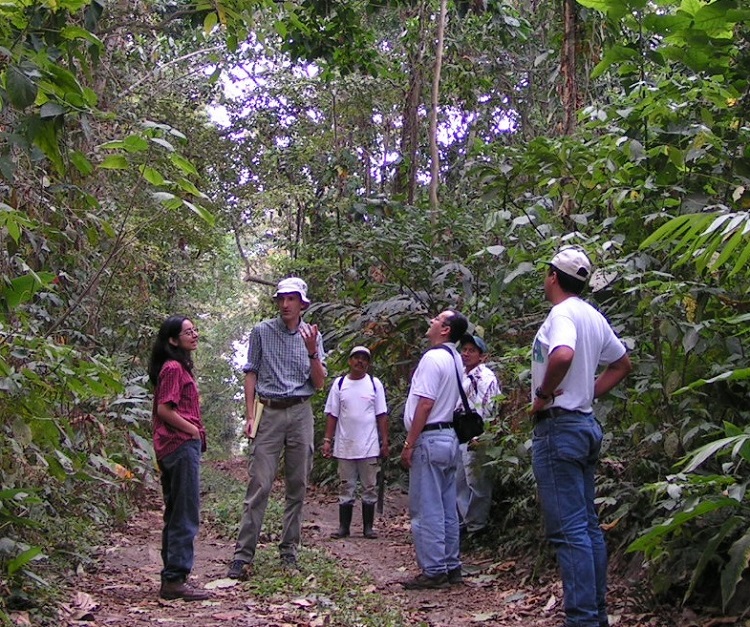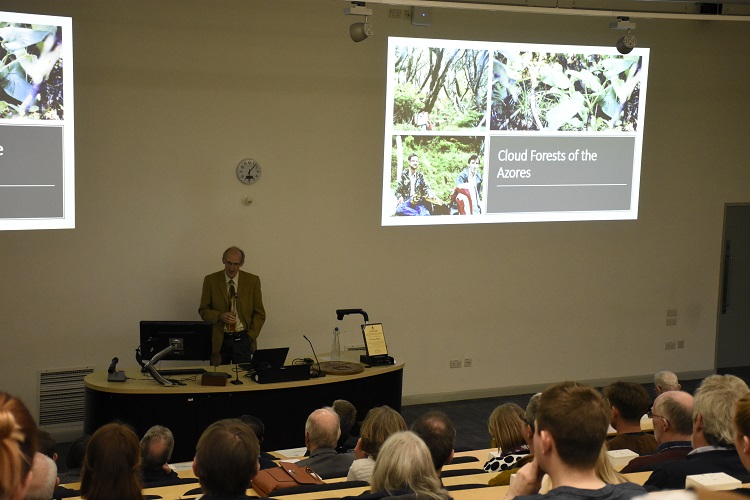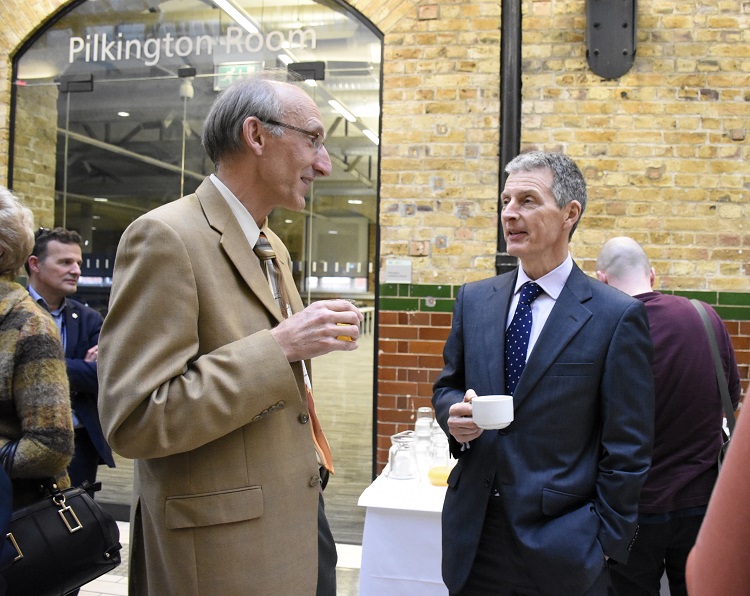
On Wednesday 20th March 2019, the Pilkington lecture theatre at the Medway Campus, University of Greenwich, filled up with staff, students and guests, keen to hear Professor Jeremy Haggar’s inaugural lecture: Seeking Sustainability in Agricultural Systems.
When a distinguished professor stands up to address an assembled audience, it’s easy to imagine that they arrived at this place in time fully formed. But of course, they, just like everyone else, have been on a journey of discovery that has led them to this place of professional accomplishment.
Professor Jeremy Haggar is renowned in his field of agroecology, but his original passion lay in nature conservation and in particular, wildlife. It seems it runs in the blood as his mother’s family were farmers and his father was an agricultural advisor for the Ministry of Agriculture. He explains, “when I was at university I was all about the ecology of endangered species, but to properly conserve species and their habitat, I realised it was imperative to work with the local communities to develop sustainable agriculture and development. I guess I decided to short-cut that lesson and move straight into trying to understand how I could promote better sustainable agriculture to relieve pressure on natural areas.”
Professor Haggar believes that the more you understand about a subject, the more you realise there is to know. In his particular area of sustainable agriculture, Professor Haggar started out by understanding soil plant interactions and maintaining soil fertility. Then he studied in depth, the overall production system followed by the integration of the economic, social and institutional aspects concerning who’s going to provide the inputs, business and marketing and of course, the exports. In his view it is an ever-expanding area which in turn, makes it fascinating.
 Fascinating maybe, but rarely straightforward. Professor Haggar outlines the conundrums involved; “the global tendency is that the increase and expansion of agriculture for increasing food production has been at the expense of the environment. It’s one of the major drivers of climate change, it’s probably THE major driver of bio-diversity loss and so the broader picture is that there is a competition, if you like, between those two.”
Fascinating maybe, but rarely straightforward. Professor Haggar outlines the conundrums involved; “the global tendency is that the increase and expansion of agriculture for increasing food production has been at the expense of the environment. It’s one of the major drivers of climate change, it’s probably THE major driver of bio-diversity loss and so the broader picture is that there is a competition, if you like, between those two.”
“At the same time, we know examples of where they can be brought together and certainly be compatible, so the question is, what are the conditions that can enable that to happen? When I started out as a plant ecologist, I applied that ecological knowledge to how, on the one hand we could manage agricultural systems to at least initially reduce the environmental impacts, and on the other, to improve the ecological sustainability of the production.”
Society now accepts that we are in danger of running out of our natural resources if we carry on as we are. It’s also widely acknowledged within the scientific community that we can’t keep on over-exploiting the water, nitrogen and phosphorus which underpin our agricultural processes. Ultimately, agricultural production is going to have to be based on better understanding of the ecology of what sustains production, because the shortcut achieved by using chemicals is simply not sustainable.
One of Professor Haggar’s main challenges is working with farmers to take up sustainable practices. He outlines his approach by saying, “you have to turn the question around the other way and find out and understand what motivates farmers and why they make the decisions they do, and what their production objectives are. You can then work with them to help achieve their sustainability gains and often those farmers are aware of many of the same issues. What agricultural development traditionally does, is work out what is agronomically the best thing to do, makes a recommendation and helps everybody to do it.”
 Upon completing his PhD, Professor Haggar took the opportunity from 1991–1994, of a Post-Doc with Jack Ewel from the University of Florida which involved managing a long-term experiment in Costa Rica. The project looked at how different types of trees and perennial plants interacted in either a complementary, or competitive way and how this affected overall productivity.
Upon completing his PhD, Professor Haggar took the opportunity from 1991–1994, of a Post-Doc with Jack Ewel from the University of Florida which involved managing a long-term experiment in Costa Rica. The project looked at how different types of trees and perennial plants interacted in either a complementary, or competitive way and how this affected overall productivity.
The Professor outlined how, in his next posting in Costa Rica as Forestry Coordinator for the Organisation of Tropical Studies, he was able to put what he’d learnt about intercropping to practical use; “the farmers were participating in government-subsidised reforestation and wanted to integrate crops. The Forestry Department was not keen on this, so the Farmer Association asked us for support and we were able to show that the trees indeed grew much better when associated with crops.”
What would Professor Haggar say to someone thinking of going into his field of expertise? “I would encourage it. With recent events you start to wonder to what degree your generation has succeeded and I wish the next generation more success than we had. Looking at the overall trends with climate change and biodiversity loss I can see there are considerable efforts going into addressing both of them, but we’re still not obviously managing the scale of change needed. I do wonder what needed to have happened differently over the past 20 years that didn’t?”
It’s important to note that Professor Haggar does feel hopeful for the future, but he fears that the level of action and recognition that is needed to avoid a significant impact on our global wellbeing is not going to happen in time. He remains confident that we and nature and the earth will adapt but we will go through some “difficult times”.
 That Professor Haggar is passionate about his work is very much in evidence; “I guess one of the most rewarding parts for me and what I enjoy talking about most, is the interactions with the farmers and their organisations, the cooperatives in Central America and Sierra Leone, and to have the feeling that I have made some contribution to perhaps improving people’s lives and maybe taking them in a different direction, and that’s an important part of my lecture.”
That Professor Haggar is passionate about his work is very much in evidence; “I guess one of the most rewarding parts for me and what I enjoy talking about most, is the interactions with the farmers and their organisations, the cooperatives in Central America and Sierra Leone, and to have the feeling that I have made some contribution to perhaps improving people’s lives and maybe taking them in a different direction, and that’s an important part of my lecture.”
“For me it’s the application of the knowledge which is my reward. I bring the research knowledge to farmers and then apply that knowledge with them to try to and identify why there’s a problem, and address it and find a solution. That’s why after doing my PhD and post-Doc, I moved away from purely academic research towards more applied research. When I was living and working in Nicaragua, managing what you might call research and development projects which had a significant development component to them, I got to contribute to real substantive change. That’s what I enjoy the most.”
Links: Professor Haggar's profile |

